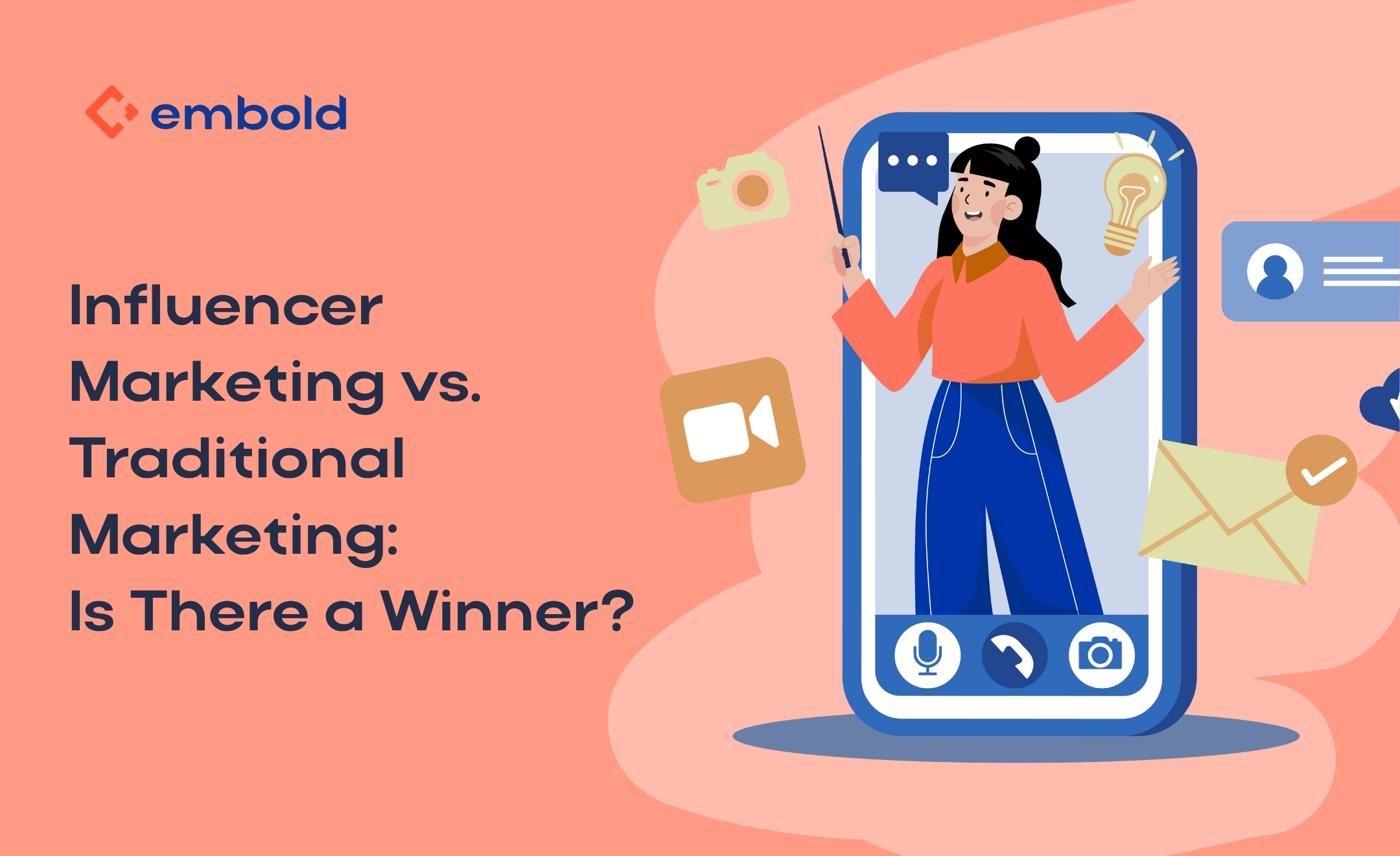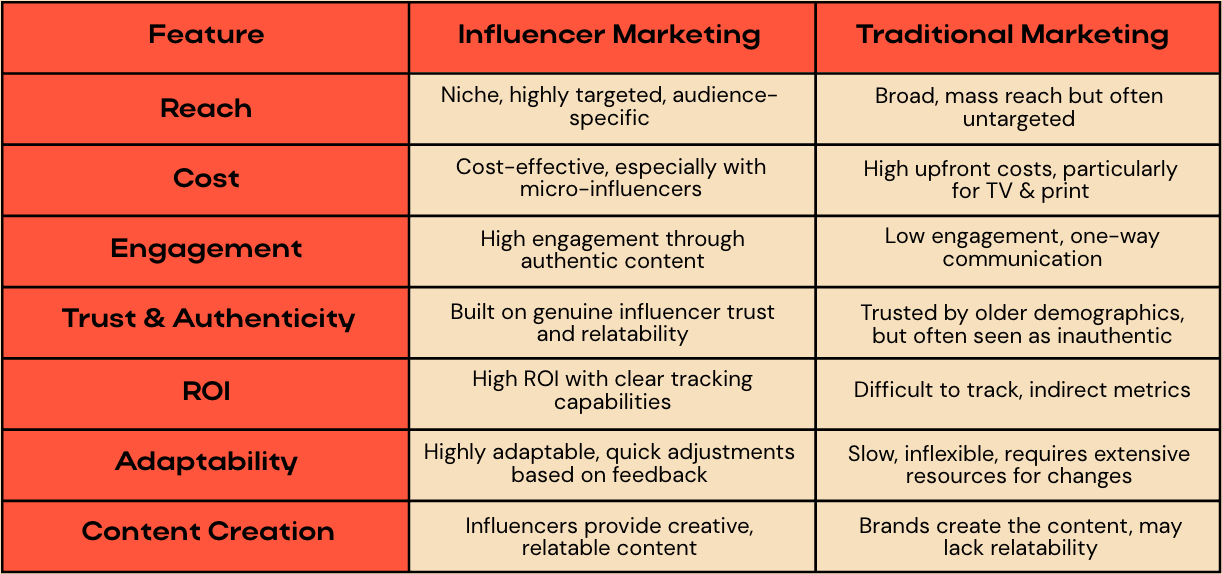
Influencer Marketing vs. Traditional Marketing: Is There a Winner?

As the marketing landscape in Canada continues to evolve, businesses and agencies face an essential question: Should we rely on traditional marketing methods, or is influencer marketing the better option?
With the rapid shift in how consumers engage with brands, understanding the pros and cons of both approaches can help Canadian businesses make informed decisions that lead to long-term success. In this blog, we’ll explore the differences between influencer marketing and traditional marketing, the unique benefits of each, and how Canadian brands can leverage both to grow and thrive.
The Shift in the Canadian Marketing Landscape: Why Traditional Methods Are Losing Ground
Canada’s marketing landscape is shifting in favor of digital strategies. Traditional media – including TV, radio, print ads, and billboards – is gradually losing ground to the digital space, particularly social media.
Decline in Traditional Media Consumption
Consider this: Television industry revenue in Canada dropped from $7.1 billion in 2010 to $6.4 billion in 2023, while print readership plunged from 42% to 19% in the same period. These numbers clearly show that Canadian consumers are spending less time engaging with traditional media channels. Instead, digital advertising in Canada is on the rise, projected to surpass CA$10 billion and account for 64.3% of total media ad spending by 2025.
This seismic shift is a response to changes in consumer preferences: Canadians are more digitally connected than ever before, and they expect personalized, on-demand content.
Ad Blindness: The Growing Problem for Traditional Marketing
As traditional media channels become oversaturated with ads, consumers are increasingly ignoring advertisements. People are developing ad blindness, tuning out TV commercials, print ads, and digital banners because they’re exposed to so many marketing messages daily. This makes it more challenging for Canadian brands to capture attention through traditional advertising, forcing them to explore alternative marketing strategies.
Understanding Influencer Marketing in Canada: A Powerful Tool for Engagement
The rise of social media platforms such as Instagram, YouTube, and TikTok has reshaped how brands reach their target audience. Influencer marketing has quickly emerged as a dominant force in the digital advertising world, and its success is deeply tied to the strong, authentic relationships influencers maintain with their followers.
What is Influencer Marketing?
Influencer marketing is a strategy that involves partnering with individuals (influencers) who have a significant following on social media. These influencers have built trust and authority in their niche, and brands work with them to promote products or services through authentic content.
Why Influencer Marketing Works in Canada
In Canada, the influencer marketing ecosystem is booming, and Embold is at the forefront of this change, offering Canadian businesses access to a network of over 9,000 vetted Canadian influencers. Unlike traditional advertising, influencer marketing enables brands to target specific niche audiences, ensuring that marketing messages are seen by the right people. With Canadian consumers becoming increasingly diverse, influencer marketing's ability to connect with culturally relevant, localized content makes it an ideal choice.
The Benefits of Influencer Marketing for Canadian Brands
Influencer marketing offers distinct advantages for Canadian brands, making it a compelling choice in today’s marketing environment. Let’s break down why influencer marketing is essential for Canadian businesses.
1. Precision Targeting
While traditional marketing broadcasts messages to broad, often untargeted audiences, influencer marketing allows for precise targeting. Influencers have cultivated strong relationships with their audiences, often focusing on niche groups, whether they’re health-conscious individuals or tech-savvy millennials.
For Canadian businesses, this means you can reach specific demographic groups, whether it's young parents in Ontario or seniors in rural communities.
2. Authentic Engagement and Trust
Consumers trust influencers more than brands. According to Nielsen’s Global Trust in Advertising Report, 92% of consumers trust recommendations from individuals over brands. This is because influencers have built genuine connections with their audiences, and their product endorsements feel more like trusted advice from a friend rather than a hard sell.
3. High Return on Investment (ROI)
Influencer marketing can be cost-effective, especially when working with micro-influencers. According to a report from Influencer Marketing Hub, the average ROI for influencer marketing campaigns is $5.78 for every $1 spent, with top brands reaching ROI of over $20. For Canadian businesses, influencer marketing offers a powerful way to drive higher ROI, making it an attractive option for companies with limited marketing budgets.
4. Engaging Content Creation
Influencers are content creators by nature. When brands collaborate with influencers, they not only benefit from the influencer’s audience but also from their creativity and content production skills. Whether it’s a beautiful Instagram post, a storytelling video on TikTok, or an unboxing YouTube video, influencer content resonates better with audiences. Brands can also repurpose influencer content across various marketing channels, maximizing the value of each piece.
The Limitations of Influencer Marketing
While influencer marketing is a powerful tool, it comes with its own set of challenges, especially for Canadian brands. Let’s explore these limitations.
1. Finding the Right Influencer
One of the most significant challenges in influencer marketing is identifying influencers who align with your brand values and resonate with your target audience. If the influencer's authenticity is questioned, the campaign’s credibility could take a hit.
2. Managing Partnerships
Influencer marketing often requires long-term relationships with influencers. Brands must manage multiple influencers and their ongoing content creation, which can sometimes be resource-intensive. Influencers can also face public scrutiny, which might affect the brand's image if not managed carefully.
3. Measurement and ROI Tracking
While influencer marketing offers a clear return on investment, measuring success beyond likes and shares can be challenging. Brands need to track more granular metrics such as sales conversion and brand sentiment.
Traditional Marketing: A Reliable but Outdated Option?
Despite the rise of digital and influencer marketing, traditional marketing continues to have a significant role in certain industries. Traditional marketing includes TV, print, radio, direct mail, and outdoor advertising. While it may be on the decline, it still offers benefits for Canadian brands.
1. Broad Reach
Traditional marketing can reach a broad and diverse audience quickly. For Canadian brands that want to reinforce local presence or regional awareness, traditional advertising methods like billboards and print media can be effective.
2. Established Trust and Credibility
Traditional marketing is often viewed as more credible because it has been around for decades. Consumers, particularly older demographics, are more familiar with these formats and are more likely to trust TV ads or print advertisements than newer digital alternatives.
3. Control Over Messaging
One of the advantages of traditional marketing is that brands have full control over their message. There is no intermediary (like an influencer) to potentially distort the brand’s narrative. Brands can carefully craft their messaging to align with their objectives.
Influencer Marketing vs. Traditional Marketing: A Direct Comparison

Conclusion: A Blended Approach for Canadian Brands
Rather than choosing between influencer marketing and traditional marketing, the best approach for Canadian brands is to blend both strategies. Traditional marketing excels at building brand awareness and reaching broad demographics, while influencer marketing enables brands to connect with highly engaged, niche audiences in an authentic way.
For Canadian brands looking to optimize their marketing efforts, leveraging Embold is a game-changer. With over 9,000 vetted influencers, a data-driven platform, and end-to-end campaign management, Embold empowers businesses to execute influencer campaigns that deliver real results.
If you’re a Canadian brand looking to scale your influencer marketing, get in touch with Embold today. Let us help you navigate the evolving marketing landscape and achieve your business goals with the power of influencer marketing.
UGC is another modern alternative to traditional marketing—see how it stacks up against influencer campaigns.

The all-in-one creator marketing platform built for Canadian brands
Plan, launch, and measure all your creator campaigns from one place.
.jpg)



